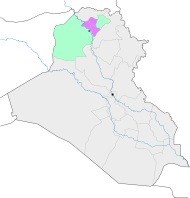
Nineveh, also known in early modern times as Kouyunjik, was an ancient Assyrian city of Upper Mesopotamia, located in the modern-day city of Mosul in northern Iraq. It is located on the eastern bank of the Tigris River and was the capital and largest city of the Neo-Assyrian Empire, as well as the largest city in the world for several decades. Today, it is a common name for the half of Mosul that lies on the eastern bank of the Tigris, and the country's Nineveh Governorate takes its name from it.
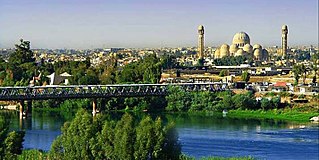
Mosul is a major city in northern Iraq, serving as the capital of Nineveh Governorate. The city is considered the second-largest city in Iraq in terms of population and area after the capital Baghdad. Mosul is approximately 400 km (250 mi) north of Baghdad on the Tigris river. The Mosul metropolitan area has grown from the old city on the western side to encompass substantial areas on both the "Left Bank" and the "Right Bank", as locals call the two riverbanks. Mosul encloses the ruins of the ancient Assyrian city of Nineveh – once the largest city in the world – on its east side.
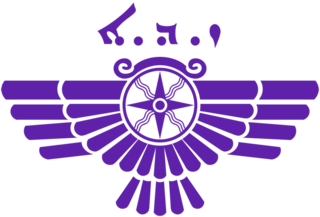
The Assyrian Democratic Movement, popularly known as Zowaa, is an Assyrian political party situated in Iraq, and one of the main Assyrian parties within the Iraqi parliament. The Assyrian Democratic Movement states its aims are to establish equal citizenship rights with the rest of the Iraqi people without discrimination on the basis of nationality, belief, religious affiliation, culture, language and other characteristics of the native Assyrians of Iraq, to acknowledge the past massacres committed against them and to ensure they are never repeated again.

Ankawa is a suburb of Erbil in the Kurdistan Region of Iraq. It is located 8 kilometres (5 mi) northwest of downtown Erbil. The suburb is predominantly populated by Christian Assyrians, most of whom adhere to the Chaldean Catholic Church.
Karamlesh is a town in northern Iraq located less than 18 miles (29 km) south east of Mosul.
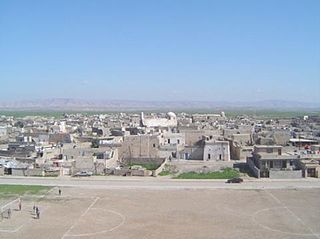
Tesqopa or Tel Skuf, also Tel Eskof or Tall Asqaf is a town in northern Iraq located approximately 19 miles north of Mosul. The town is populated by Assyrians and they are members of the Chaldean Catholic Church.
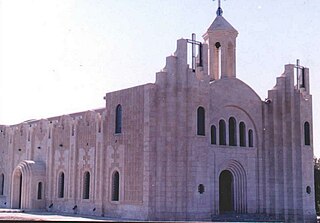
Bartella is a town that is located in the Nineveh Plains in northern Iraq, about 21 kilometres east of Mosul.

Qaraqosh, is an Assyrian city in the Nineveh Governorate, of Iraq located about 32 kilometres (20 mi) southeast of the city of Mosul and 60 kilometres (37 mi) west of Erbil amid agricultural lands, close to the ruins of the ancient Assyrian cities Kalhu and Nineveh.

Iraqi Assyrians are an ethnic and linguistic minority group, indigenous to Upper Mesopotamia. They are defined as Assyrians residing in the country of Iraq, or members of the Assyrian diaspora who are of Iraqi-Assyrian heritage. They share a common history and ethnic identity, rooted in shared linguistic, cultural and religious traditions, with Assyrians in Iran, Turkey and Syria, as well as with the Assyrian diaspora elsewhere. A significant number have emigrated to the United States, notably to the Detroit and Chicago; a sizeable community is also found in Sydney, Australia.
Minorities in Iraq have been incredibly influential to the history of the country, and consist of various ethnic and religious groups. The largest minority group is the Kurds, with Turkmen following shortly after. Prior to the 2003 invasion of Iraq, Assyrians constituted a population of 1.5 million, and belonged to various different churches such as the Assyrian Church of the East, Chaldean Catholic Church, and the Syriac Orthodox/Catholic Churches. Other minority groups include Armenians, Mandaeans, Baha'i, among others.

The Assyrian homeland, Assyria, refers to the homeland of the Assyrian people within which Assyrian civilisation developed, located in their indigenous Upper Mesopotamia. The territory that forms the Assyrian homeland is, similarly to the rest of Mesopotamia, currently divided between present-day Iraq, Turkey, Iran and Syria. In Iran, the Urmia Plain forms a thin margin of the ancestral Assyrian homeland in the north-west, and the only section of the Assyrian homeland beyond the Mesopotamian region. The majority of Assyrians in Iran currently reside in the capital city, Tehran.

Nineveh Plains is a region in Nineveh Governorate in Iraq, to the north and east of the city Mosul. Control over the region is contested between Iraqi security forces, KRG security forces, Assyrian security forces, Babylon Brigade and the Shabak Militia.

The Christians of Iraq are considered to be one of the oldest continuous Christian communities in the world.
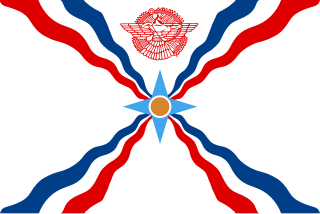
The Assyrian independence movement is a political movement and ethno-nationalist desire of ethnic Assyrians to live in their indigenous Assyrian homeland in northern Mesopotamia under the self-governance of an Assyrian State.

Tel Keppe is a town in northern Iraq. It is located in the Nineveh Governorate, less than 8 mi (13 km) northeast of Mosul.
The Assyrian exodus from Iraq is a part of refers to the mass flight and expulsion of ethnic Assyrians from Iraq, a process which was initiated from the beginning of Iraq War in 2003 and continues to this day. Leaders of Iraq's Assyrian community estimate that over two-thirds of the Iraqi Assyrian population may have fled the country or been internally displaced since the U.S.-led invasion in 2003 until 2011. Reports suggest that whole neighborhoods of Assyrians have cleared out in the cities of Baghdad and Basra, and that Sunni insurgent groups and militias have threatened Assyrians. Following the campaign of the Islamic State of Iraq and the Levant in northern Iraq in August 2014, one quarter of the remaining Iraqi Assyrians fled the Jihadists, finding refuge in Turkey and Kurdistan Region.
The persecution of Christians by the Islamic State involves the systematic mass murder of Christian minorities, within the regions of Iraq, Syria, Egypt, Libya, Democratic Republic of the Congo, Mozambique and Nigeria controlled by the Islamic extremist group Islamic State. Persecution of Christian minorities climaxed following the Syrian civil war and later by its spillover.
Anti-Assyrian sentiment, also known as anti-Assyrianism and Assyrophobia, is a diverse spectrum of negative feelings, dislikes, fears, aversion, racism, derision and/or prejudice towards Assyrians, Assyria, and Assyrian culture.

Al-Nabi Yunus Mosque was a historic mosque located in Mosul, Iraq. It contained a tomb believed to be that of the Biblical prophet Jonah, known as Yunus by Muslims.


